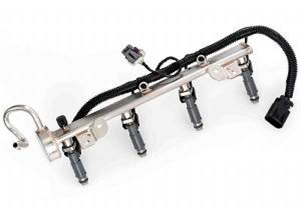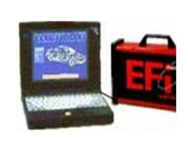EFI Service/Diagnostics
Petrol Fuel Injector Cleaning
Our specialised injector cleaning equipment can pulse the injectors up to 9900 pulses per minute and that is the range necessary to carry out tests on the latest engines in the market today. Our injector cleaning service uses ultra-sonic cleaning in a mild detergent type cleaning fluid that is both non-toxic and environmentaly sound.
Why clean injectors?
Every time you stop a hot engine a small amount of
residue adds to the already present build up on your vehicle's
injectors. The more frequent the stops, the more rapidly the build up
accumulates. This accumulation eventually reduces the flow of fuel
through the injector and disrupts its spray pattern, causing the engine
to run lean. This can cause a number of problems, although the most
common is driveability problems such as flat spots and hesitations.
Most fuels do contain detergents to clean the fuel system and injectors.
However there is a limit to what they can achieve and it is sometimes
necessary to use a more severe cleaner to remove long-term
accumulations.
 | Fuel Injectors are cleaned using ultrasonic equipment to ensure all residue and contiminants are removed. |
Things you need to know
- Injectors need to be clean in order to operate properly. Injectors which are contaminated at the seat will drip or spray when the computer thinks they are closed.
- There are over 30 different configurations of electronic injectors on the market today.
- Some engines today can easily achieve 7000 to 7500 RPM and EFI test equipment must have the rpm range necessary to locate difficult problems.
- Some inferior EFI equipment will actually attack and destroy alloy components found in modern injectors.
- Carbon deposits in the injector port only .5 microns thick can reduce an injector’s flow by up to 25% causing rough idle, poor acceleration and poor fuel economy.

